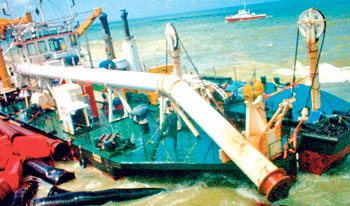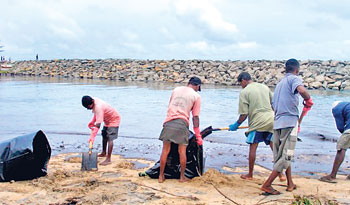As the United States of America battles the catastrophic Deepwater Horizon oil spill in the Gulf of Mexico, half a world away in Sri Lanka a shipping polluter who dumped a huge load of hazardous sulphuric acid off Trincomalee was booked with a fine of Rs. 10 million by the Colombo High Court.
When the M.T. Granba, the Turkish tanker on its way from Tuticorin to Budge Budge in India developed trouble on April 5, last year with two of its acid-holding cargo tanks leaking to the ballast tanks the crew didn’t call for help from the Sri Lankan government, says the Marine Environment Protection Authority (MEPA) Chairman M.A.R. Kularatne.
They attempted to mend the tanks themselves and sought assistance from the Navy and the Ports Authority only at the last minute, after dropping anchor off Foul Point in Trincomalee when matters got out of hand. MEPA was informed soon after and rushed to Trincomalee, while the Navy was rescuing the crew which had already abandoned ship and were in life boats, he said.
 |
| M.V. Marina Sedna after hitting the breakwater at the Galle harbour. Its engine oil had to be pumped into bowsers. |
While awaiting a salvage operation by the owners, the tanker sank on April 9 and MEPA lodged a complaint with the Trincomalee Harbour Police to initiate legal action, says Mr. Kularatne, adding that under the Marine Pollution Prevention Act, No 35 of 200, MEPA then requested the CID to proceed with a criminal liability case. Fines for criminal liability range from Rs. 1 to Rs. 15 million under the Marine Pollution Prevention Act.
Explaining the vital role played by MEPA, the agency which implements the Act, Mr. Kularatne says it is two pronged – the regulatory function is to prevent marine pollution by using legislative authority to catch the culprits and also give effect to international instruments in relation to this aspect. “We engage in conserving, preventing, controlling and managing any threats to the marine environment.”
Worldwide pollution of the marine environment, the Sunday Times understands, occurs not only from maritime activity (40%) such as ship action, oil spills, war, destruction of habitats and harbour activity but also from land-based activity (60%) such as discharge of effluents, sewage and garbage both by people and industries along the coastal belt.
Ironically, in Sri Lanka, contradicting worldwide trends, land-based activity contributes 90% and marine-based activity only 10% towards the polluting of the marine environment. For, more than 70% of organized industries are in coastal areas while more than 65% of the population lives in the coastal zone.
MEPA is, therefore, focusing on making the people living along the coastline aware about the dangers of dumping rubbish into the sea. “These are only small fry and once they are made aware they do begin to protect the area but we need to crackdown on the big fish like the hoteliers and industrialists who knowingly on the sly channel their waste into the sea. Some of them switch off their water purification systems to cut costs and use the sea as their dump yard.”
Pointing out that even an incident inland could affect water bodies including the sea, Mr. Kularatne cites a fuel bowser accident at Mawanella about a year ago. The fuel leaked into the Maha Oya and it was the water intake at Alawwa that was affected.MEPA officers were very vigilant, for they feared that the Maha Oya would carry the fuel to the sea. “I rushed my people to the Kochchikade estuary but fortunately it didn’t come to the sea but got diffused along the way,” he says.
 |
| Removing the oil which spilled from the Amanat Shah off Koggala. Pix courtesy MEPA |
The marine environment is owned by everybody but at the same time disowned by everybody, Mr. Kularatne told the Sunday Times. “Marine environmental issues are now being discussed as pollution is becoming a threat to our own existence. Every country which has a coastline has about 200 nautical miles of sea as their territorial boundary. But we can’t see where exactly it ends. Its resources like fisheries are shared by everybody.”
The Granba was not the only shipping miscreant that MEPA has had to deal with in the recent past.
In 2006, the M.V. Amanat Shah was carrying teak logs from Burma to Bangladesh when it developed trouble and sank 11 kms off Koggala, causing a hazardous oil-spill of 25 metric tons (usually depending on its voyage vessels carry at least 150 metric tons of engine oil) and releasing over 800 logs into the sea.
MEPA had never faced such a challenge before – but rose to the occasion, rushing all of its 100 staff, camping in the “disaster area” for 11 days and mobilizing the support of the Army, Navy, Ports Authority and environmental non-governmental organizations as well as the Indian Coastguard in damage-control efforts.
Worried that the oil would get to areas such as Madol Duwa with the high tide, MEPA manufactured a “boom” (a large, floating sausage-like tube filled with straw and chicken feathers, according to Mr. Kularatne), encircled the huge oil spill and filled up all the available polythene bags with the oil.
Keeping the bulging polythene bags of oil at the Boossa Timber Corporation, MEPA’s next dilemma was how to dispose of them. “We couldn’t bury them, so the answer was incineration and we took them under police escort to Holcim Lanka at Puttalam,” he says, recalling how his staff also “hand-washed” crabs, fish and even serpents covered in oil and put them back in the water.
Most of the teak logs were carried off by the people or taken by the Timber Corporation, it is learnt.
Another incident was when the M.V. Marina Sedna carrying a dredger tilted and hit the breakwater of the Galle harbour. “We acted quickly and pumped the engine oil into bowsers,” says Mr. Kularatne
MEPA gets to know of disasters at sea when Sri Lanka Telecom’s Colombo Radio which provides communication among ships reports an incident, a ship facing a marine emergency informs the closest port or a ship, aircraft or fishermen does so. MEPA then verifies the incident and responds quickly.
Currently, MEPA is attempting to strengthen its disaster preparedness, as the seas off southern Sri Lanka are a major shipping route, with around 350 vessels passing the tip of Hambantota every day.
“We should be ready, as a shipping accident on that route will have a big impact. Our capability and also national capability should be enhanced to deal with such an emergency,” stresses Mr. Kularatne.
At present MEPA carries out awareness campaigns to inform people, through its offices at Colombo, Negombo, Puttalam, Kalutara, Galle, Matara and Hambantota, about the urgent need to stop polluting any water body in the country as that in turn affects the sea. Two more offices at Jaffna and Trincomalee will be opened this month. MEPA is currently in the process of upgrading the National Oil Spill Contingency Plan. Once that is in place, in the event of an oil spill, MEPA will turn into an Operation Centre able to mobilize all relevant institutions for sea rescue and other activity as well as land clearance.
Monitoring oil prospecting
in Mannar basin
With Sri Lanka looking towards oil exploration in the Mannar basin, MEPA will be looking after the environmental component, the Sunday Times understands.
It will act as the project-approving agency for environmental concerns and is awaiting an Environmental Impact Assessment from Cairn Lanka Pvt. Limited which has tendered and secured a block in the Mannar basin and hopes to begin exploration and drilling in 2011, MEPA Chairman Kularatne said, adding that Petroleum Exploration Regulations are ready to be gazetted. |



